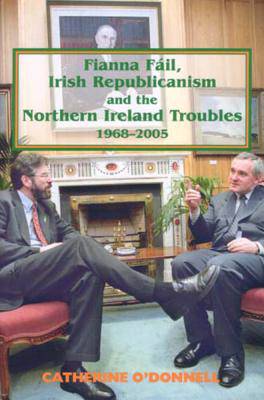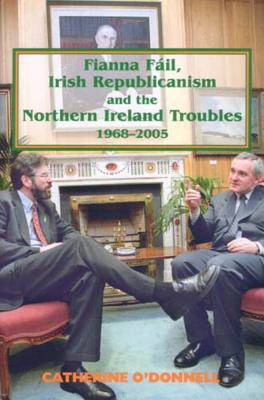
- Afhalen na 1 uur in een winkel met voorraad
- Gratis thuislevering in België vanaf € 30
- Ruim aanbod met 7 miljoen producten
- Afhalen na 1 uur in een winkel met voorraad
- Gratis thuislevering in België vanaf € 30
- Ruim aanbod met 7 miljoen producten
Fianna Fail, Irish Republicanism and the Northern Ireland Troubles, 1968-2005
Catherine O'Donnell
Hardcover | Engels
€ 100,95
+ 201 punten
Omschrijving
Fianna FÃ?Â?Ã?¡il, the Republican Party, has been defined by its emphasis on partition and its ideological commitment to reunification. Through its use of anti-partitionist rhetoric, it has been the most vociferous political party in the Republic of Ireland on Northern Ireland. Its emotive and divisive response to the outbreak of the Troubles in Northern Ireland was seen most clearly in the Arms Crisis of 1970 which threatened to destroy the party and the stability of the state in the Republic. However, the party has also been at the centre of the Northern Ireland peace process, and the attempts at reconciliation between Unionists and Nationalists and North and South. Yet there has been no substantive study of Fianna FÃ?Â?Ã?¡il's language, ideology, and policy on Northern Ireland since the outbreak of the Troubles. How could 'The Republican Party' be such a central player in the political changes in Northern Ireland? Has Fianna FÃ?Â?Ã?¡il changed its traditional republicanism and anti-partitionism? This fascinating and important new book provides an examination of Fianna FÃ?Â?Ã?¡il's record on Northern Ireland since 1968. It outlines the party's response to the Troubles and its guiding principles in the search for the solution. Catherine O'Donnell argues that the relationship between Fianna FÃ?Â?Ã?¡il and Sinn FÃ?Â?Ã?Â(c)in is central to understanding Fianna FÃ?Â?Ã?¡il's role in the peace process, which began with the Fianna FÃ?Â?Ã?¡il-Sinn FÃ?Â?Ã?Â(c)in talks in 1988. She investigates the implications of the peace process and the Good Friday Agreement for Fianna FÃ?Â?Ã?¡il's ideology and policy on Northern Ireland and highlights the continued centrality of the relationship between Fianna FÃ?Â?Ã?¡il and Sinn FÃ?Â?Ã?Â(c)in to the peace process and politics in the Republic of Ireland. As Sinn FÃ?Â?Ã?Â(c)in make further electoral gains in the Republic of Ireland, this book will be essential reading for anyone wishing to understand how Republicanism is a contested electoral resource within southern politics.
Specificaties
Betrokkenen
- Auteur(s):
- Uitgeverij:
Inhoud
- Aantal bladzijden:
- 242
- Taal:
- Engels
Eigenschappen
- Productcode (EAN):
- 9780716533603
- Verschijningsdatum:
- 1/03/2007
- Uitvoering:
- Hardcover
- Formaat:
- Genaaid
- Afmetingen:
- 159 mm x 235 mm
- Gewicht:
- 557 g

Alleen bij Standaard Boekhandel
+ 201 punten op je klantenkaart van Standaard Boekhandel
Beoordelingen
We publiceren alleen reviews die voldoen aan de voorwaarden voor reviews. Bekijk onze voorwaarden voor reviews.










